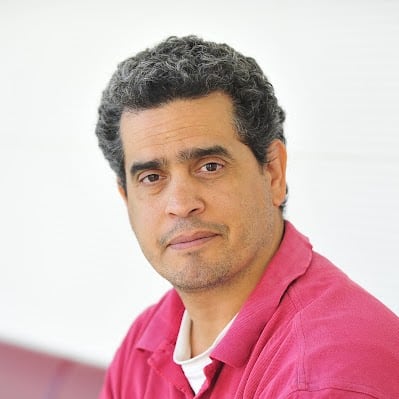Program the Supercomputer in your Pocket: Full Stack Android App Development
Learn the full stack of creating Android mobile apps through a Coursera Specialization, as described in an interview with Prof. Adam Porter of the University of Maryland.
Read all reviews for Programming Mobile Applications for Android Handheld Systems. Took the course (part 1 or part 2)? Write your own review (part 1 or part 2).
Android is the most common operating system, accounting for over 75% of the world’s smartphone market.
Mobile computing is super-hot right now. Some say we’re on the cusp of a major transformation in connecting the population of the world online. In 2014, there were estimated to be 2 billion smart phones, and this projected to grow to 4 billion by 2020, and keep rising. That means in a few years, over half the earth’s population will have the processing power of what, a decade ago was a super-computer, in their pocket. And within this huge worldwide mobile market, Android is the most common operating system, accounting for over 75% of the world’s smartphone market, and even in the iPhone-loving U.S., it has over half the market.
Adam Porter, a Professor in the Department of Computer Science at the University of Maryland, began teaching mobile app development a number of years ago. Prof. Porter estimates that in his 25 years of teaching, he has taught perhaps 2,000 students in face-to-face classes. After hearing about the massive courses being offered to the public at Stanford a few years ago, he started to explore ways to scale his teaching to a larger number of students, and obtained a sizable grant to start that pursuit. When, separately, the University of Maryland entered into a partnership with Coursera to offer online courses, and requested proposals from the faculty, he saw that this was a good fit, and started to develop a course on Android app development.
There have been a total of half a million registrations for his course.
Prof. Porter was not sure how many people would sign up for the course, though based on other precedents, he anticipated a few tens of thousands. In his first session, however, there were over 250,000 sign-ups, and with around half of them interacting with the course, this was two orders of magnitude larger than his total number of students in 25 years of teaching! After subsequent sessions, there have been a total of half a million registrations for his course. Besides the sheer scale achieved, another important aspect is geographic diversity: about 40% of those enrolled were from emerging economies. People from these areas are, at the same time, those who are adopting mobile technology the quickest (in many areas internet connectivity is more reliable than electricity), and also those who are least likely to have the opportunity to attend Prof. Porter’s campus class in suburban Maryland, near Washington, DC.
A Unique Full Stack Android Specialization
Coursera approached Dr. Porter with the idea of coordinating a group of courses to cover the topic more thoroughly, and thus was born the first Coursera Specialization: Mobile Cloud Computing with Android, a series of six courses (4-5 weeks each, plus a capstone course. In order to assemble this Specialization, Dr. Porter collaborated with two professors at Vanderbilt University, Douglas Schmidt and Jules White. Collaborating with colleagues across universities for research is very common, but doing so for teaching purposes is very unusual. Yet, Prof. Porter saw that this would be an opportunity to create unique value for his students: his course would focus on app development and his colleagues at Vanderbilt would focus on communication services and cloud computing. Thus, the Specialization covers the full mobile app development stack, as Dr. Porter describes in this video:
Note that these courses assume that you have programming experience, though not necessarily mobile experience. Prof. Porter indicates that the course is challenging, as it is based on his campus course, which is designed for sophomore or junior computer science majors:
“I wanted this to be the same level of quality that we would expect out of a University of Maryland graduate”
Once learners pass the six courses, they can work on an 8-week capstone project to tie all of these skills together in a full project.
A Relevant Capstone Project
Learners in the Capstone Project have a choice among three types of projects to work on, each of which covers a fully functioning mobile app and cloud services, from start to finish. There are discussion forums, and peer assessments where learners offer feedback on each others code. Each project will be displayed in a gallery, and the top evaluated/rated projects are eligible for prizes, to get listed on the Google Play store, and to even receive feedback from Google employees. Regardless, the project is part of your digital portfolio for future reference.
There are also partnerships planned in the future with other relevant organizations:
• Amazon will offer advice on what app monetization and what factors drive app sales, based on its experience with the Amazon App Store for Android
• The New York Museum of Modern Art (MOMA) will offer insight into the artistic process, in order to bring those principles in to user interface design
Prof. Porter thinks it is important to keep the dialog going with industry so that learners can stay in the loop on what is in demand:
“When I talk with folks in industry, they are interested in having certain things taught or providing certain perspectives. We get together and work on it…and I think that is beneficial for everybody”
Knowing Mobile Helps Career ‘Mobility’
As you can see, the purpose of this course is to get people the skills they need to become Android developers. Prof. Porter indicates that a great many of his students are career changers, some may be already be programmers and want to get into mobile development, while others have just learned the basics of programming. Although this Specialization can’t cover everything related to Android development, it will provide a solid base. These courses have helped people change jobs, get internships, and one learner even won an app contest. Prof. Porter is proud to say:
“There are people who are really doing work in Android app development, in some part because of the things that they learned in my class”
This has been echoed by students–a Class Central user said: “The course…covers everything for a new android developer to start a new career in mobile development.” With the explosion of mobile technology, the number and types of great mobile applications that we will need are mind-boggling. And someone will need to create them. Thanks to Professors Porter, Schmidt, and White, through this Specialization a large number of future Android developers will be able to get their training.
★★★★★
“The course…covers everything for a new android developer to start a new career in mobile development.”
– Review by Class Central User
If you are interested, you can enroll in any of the six courses in the Mobile Cloud Computing with Android Specialization, each having several start dates this year. You can choose to pay $343 to earn the Specialization Certificate (non-credit, issued by the University of Maryland, and Vanderbilt University through Coursera) if you pass all six courses and the Capstone project, which has its next session in September.








Jose Delgado
I did part 1 and 2 both are excellent courses… They are very interesting and well structured. Labs really made me work and I learned a lot. I’m really happy and satisfied about taken them. Special thanks Dr. Porter and TAs, same to University of Maryland and Coursera for delivering this amazing MOOC!
Tridibesh Das
I had participated in part 1 and 2 of this full stack Android specialization program. It is well planned, structured with special emphasis on practicals. I am associated with the IT Industry for last 15 years or more and can assure that this course is completely equivalent to any university specialization program. Thank you Dr Porter and Coursera.
Dmitri
Thank you for the Cource, mr Porter. It was an amazing experience! Excellent work!
Jimmy Pautz
I tried to get started, but the environment that the videos was done it was outdated and I didn’t have enough time to figure out the differences between Eclipse (from the videos) and Android Studio. I can’t recommend this course until it is updated.
Samer Samara
It was an amazing experience for me , the most cou rse I get information from ever. am really grateful and thankful for the instructor and every one helped in this course.
William L
Excellent course!! These courses gave me a great revision, corrected some of my concepts, and taught me a lot more new materials. I recommend this course to those who wants to challenge themselves. Thanks Prof Porter and team.
marjorie moreno
Thanks Mr. Porter. It is the best course ever. The explanations were crystal clear and I have learned a lot here.
Lelo
I learned a lot. Of course it is expected that you’ll have to figure out some things at your own. Nevertheless, it is good stuff.
Maziar Mehrabi
I used to struggle a lot in learning Android before I took these courses. Prof. A. Porter explains everything clearly and the studying facilities provided by Coursera platform such as discussion forums and peer assessments makes the learning process much easier.
Jorge Agudo Praena
This course makes learning to program Android apps easy and funny. I would definitely recommend to anyway who has absolutely no background on mobile development (as me) and wants to start quickly but on solid knowledge. It’s a super course and Pr Porter is excels at explaining all the concepts.
Scott
I enjoyed the class and learned a lot. The video lectures were clear and provided a very good overview of the topics.
I found the labs were very difficult. The lectures gave you an overview but the labs were in the details. The lectures did not give you enough so you had to go hunting in the online documentation. While that is fine in general, many times I was directed to very high level documentation. I often felt I was left to try random code snippets without a clear understanding of what or why. Overall I think the gap between the lectures and coding was too large and left too much unclear.
Erick
I had programmed before with Android. But in this class I learned that I did not know the fundamentals about Android. This first part of the course has complimented my knowledge about Android. I will continue studying the remains of the courses, of course.
Mohammad Sayed
As a mobile developer, I participated in part 1 and 2 and It’s really Ammaaaaazing…… Every lesson is structured, focused, available and the purpose of those courses are really obviouse and very clear….
Each lab focuses on what you learned from the lectures, also you have a lot of attempts to try over and over to develop your knowledge and don’t care about the grades…. I wish all academic universties and schools learn that concept from this great teacher “Dr. Adam Porter”… “grades don’t matter, what you learn is all the matter”…. I wish that I can see you Dr. Adam and thank you by myself….. Great Teacher and great team
Thanks alot =)
Rupal K
The lectures and the labs were very well structured and organized, and easy to understand. It was as good as a classroom experience. Thank you for this amazing compilation, Mr. Porter.